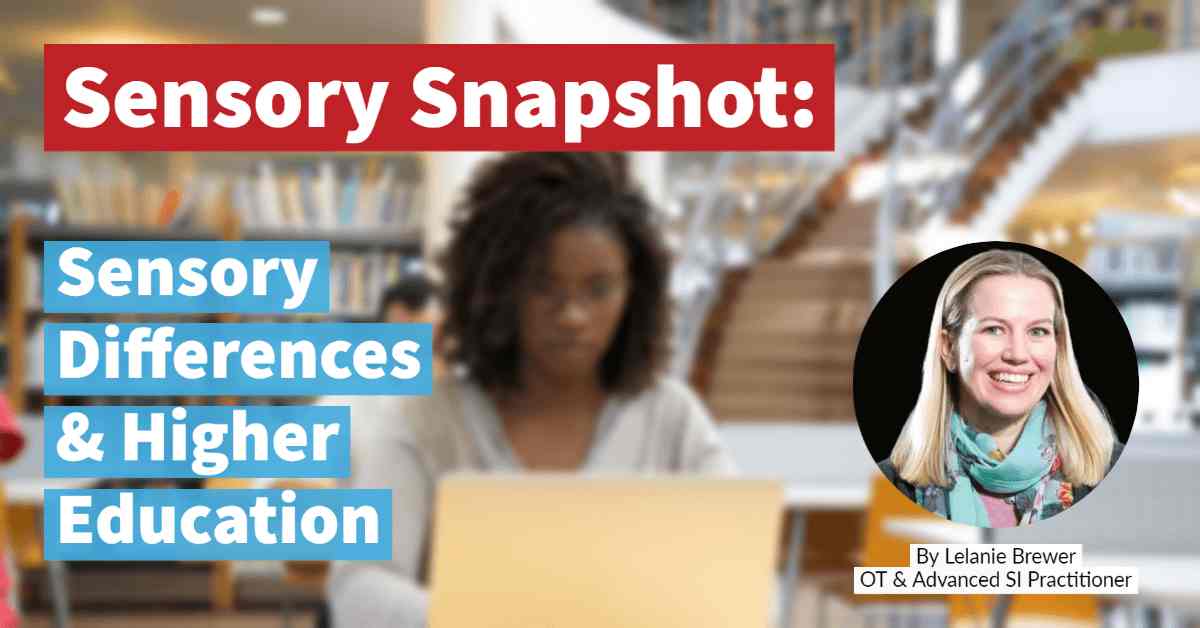Sensory Snapshot: Sensory Differences and Higher Education (Part 1)
By Lelanie Brewer, 20 March 2023

There is a lot written about how to support individuals with sensory processing and integration differences at school, but there needs to be more out there regarding advice and support for individuals at university who present with these difficulties.
Sensory processing and integration differences can affect individuals of all ages; therefore, the learning needs of students fresh out of school, as well as mature students, are equally important. Whilst different factors will come into play, sensory processing differences can impact both students on campus and distance learners. Let’s first look at some of the challenges for on-campus students.
Challenges can present themselves in the general environment and the classroom for students on campus. Universities are typically busy places bustling with students and staff. Loud music is often played in social areas, which can be challenging for students who are over-responsive to sound (auditory sensory input). While many university cafeterias offer a good selection of food, it would be advisable for students who are ‘fussy eaters’ to check out the cafeteria’s typical menus at the start of the academic year and consider whether they would prefer to prepare their own sandwiches or meals to bring in. Many institutions offer sandwiches prepared by catering companies that typically use condiments that might not be to the taste of someone with sensory processing differences.
Students with vestibular sensory processing difficulties might find that the opportunity to move around to different classes provides a welcome sensory break. Many universities and colleges offer leisure and sports facilities which can benefit ‘sensory seekers’, helping them feel regulated, which will help them academically. For others with coordination difficulties, some campus activities may present a challenge.
For students with motor planning or praxis difficulties, going to university or college can present even more challenges than being over- or under-responsive to sensory input. Suddenly, for probably the first time in their lives, they are responsible for their own timetable, for getting up, getting ready and being at their classes on time. In addition, for many students, starting at university or college will involve moving to a new town or city. Planning where to go and finding new buildings and classrooms can be tricky and anxiety-provoking for individuals with praxis difficulties. For these students, having a campus map is a good idea as well as practising moving around the campus to understand the routes they will be doing and how long it takes to get from one place to another.
Students with sensory processing differences and other learning needs may also find accessing their learning materials and resources a challenge. I recommend that students with sensory processing differences make their learning needs known to the university or college student support services when they first arrive to ensure that they can access all forms of help available.
In the next blog post, I will look at sensory processing differences in relation to online learning.
Best wishes
Lelanie Brewer
PS: For more advice, see our article Attending University With Sensory Integration Difficulties.
Read Sensory Snapshot: Sensory Differences and Higher Education (Part 2) here
Sensory Snapshot is a regular series by Advanced SI Practitioner and OT Lelanie Brewer. Lelanie gained her MSc in OT at Brunel University, London, and is pursuing a PhD with Newcastle University. Experienced in the NHS, charity and private sectors, as well as being a UK university senior lecturer, Lelanie is the Lead for Continuous Professional Development at Sensory Integration Education.

